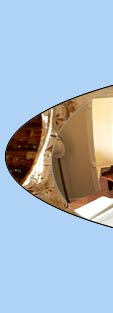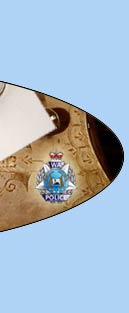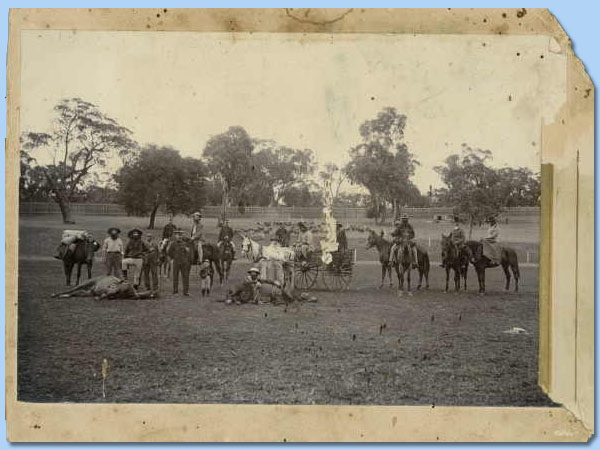
|

|

|
||

|
||||

|

|

|
||

|

|

|
||

|
||||

|

|

|
||
|
|
|
A BROTHER OF NED KELLY IN THE WESTERN AUSTRALIA POLICE
The various Australian colonies of the Victorian Age occupied a lot of space in the geographic sense, but could often seem small in human terms. The settler population was not enormous and there were obvious difficulties for persons with 'surprising' backgrounds making attempts to escape notice. Apart from small town gossip, newspapers were more numerous than today and they tended to be very frank in discussing events and people. Outlaws like Ned Kelly made headline news and surviving family members could not always elude attention. One of Ned's half-brothers became famous in his own right and even gained some benefit from brotherly infamy. Ned's mother Ellen remarried after the death of her original husband. The gentleman was an American named George King and the first fruit of their union was John, born March 19, 1875. After a brush with the law, King fled from Victoria and his children by Ellen stuck with the name Kelly. Young John was only five at the time of his big brother's last and fatal collision with the Victorian police. John, better known as Jack Kelly, earned an honest living and became a noted horseman and horse breaker by the late 1890's. He soon became part of a wider world when the famous Wirth's Circus recruited him, along with his wife Violet (Violante), as stunt riders and 'world champion' stock whip crackers and rope spinners. A tour of Australia, South Africa and Asia followed which, for the Kellys, ended in Western Australia in early 1906. They had a family to raise and became attached to Perth after an earlier circus visit. John worked as a motorman with the local tramways company. He and Violet obtained a house in Knebworth Avenue, Highgate Hill. Soon afterwards the WA Police Force tapped Jack Kelly on the shoulder, but for rather positive reasons. Commissioner Frederick Hare was keen on improving the Mounted Section and needed a horse breaker and riding instructor. A former circus mate of Jack's suggested he apply. Jack Kelly is believed to have been nervous about the business because of his family's notoriety. In addition the 'Kelly connection' had been used to the hilt by the circus for advertising purposes. Everyone in town will have known who he was. It did not matter. John Kelly, regimental number 880, became a probationary constable in the WA Police Force on March 12, 1906 and a second class constable on August 1 of the same year.  According to one account of Jack Kelly's life the interviewing officer who inducted him into the Force had this to say: "We are not interested in your brother's deeds…we understand you are in no way responsible for them, and that you have led a blameless life. You are also reputed to be an outstanding horseman…you will be judged solely on your own behaviour and your own work". Mounted trooper Kelly seems to have had a very rewarding and enjoyable time in the Police Force and, despite the supposed lack of 'interest' in Ned's deeds, the police did not shrink from taking obvious advantage of a publicity opportunity. In those days mounted officers often staged displays and 'tournaments', both to provide public entertainment at Royal Show time and other holidays and to highlight the skills of the troopers. In one 'tournament', Jack had the nerve to play step-brother Ned Kelly in a carefully staged shoot-out between police and bushrangers. The attached photographs tell their own story. Jack Kelly was a 'superstar' in policing events which were included in Perth festivals and shows for a couple of years. In the course of normal work in the Mounted section he was based at the old police stables in Roe Street, now part of the city precinct called Northbridge.  His career as a WA mounted trooper was relatively short, because a couple of years later the circus was back in town and the Kellys were made an offer they could not refuse. Constable Jack Kelly resigned on April 4 1908 and left for a world tour that would bring him international renown to the point when he was on talking terms with royalty. Kelly had a long and full life, especially when on his travels. He and Violet were made honorary members of the Royal Canadian Mounted Police and moved south through the Americas in the course of work with Barnum and Bailey's Circus. When the Great War broke out in 1914, Kelly eventually enlisted in the Australian army, served in several battles on the Western Front and reached the rank of sergeant. In the 1920s he returned to Argentina, the scene of a very successful pre-war tour, and became a highly paid instructor at the famous El Caballo Blanco riding school. There is no evidence he ever returned to Australia. John Kelly died in Buenos Aires on March 2, 1956. Peter Conole |
|
|